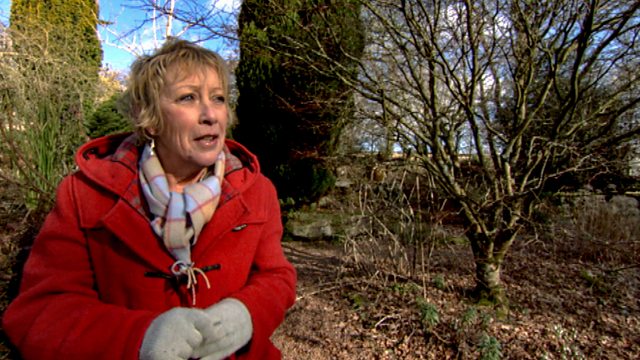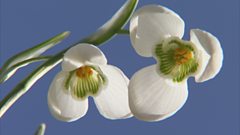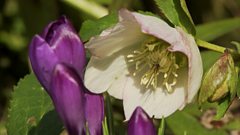
Winter
Series following a year in Carol Klein's garden in Devon. Winter has come. Carol prepares her garlic for spring planting and prunes the late-flowering clematis.
Winter has come... harsh frosts have shattered Carol's tulip pots, and her brick paths are ruined. Carol takes shelter in the potting shed and prepares her garlic for spring planting.
On finer days, she begins pruning late-flowering clematis, and when the thaw comes she begins a major re-vamp in the borders.
As the long dark days pass, the first green shoots of the new year appear. First it is snowdrops in ones and twos, and then in drifts, carpeting the woodland floor. These are then followed by jewel-like hellebores.
As winter slides into February, and whilst the trees and shrubs are still in their dormancy, a local woodsman arrives to lay Carol's native hedge.
Last on
Clips
-
![]()
Carol propagates snowdrops
Duration: 01:57
-
![]()
Carol shows how to cross-pollinate hellebores
Duration: 02:28
Native hedge – hedge laying

Hedgerows provide food and shelter for many mammals, birds and insects. A native ‘species-rich’ hedge in a garden can do much to benefit wildlife. Apart from keeping animals in and marking boundaries, native hedges lend our landscapes their unique identity and can be thousands of years old.��
Maintenance is vital in sustaining this richness, and the art of hedge laying remains an important rural skill today.
��
Pruning clematis

Carol’s crab-apple and clematis ‘Huldine’ are supposed to be grown in sweet harmony, but the clematis has taken over. Carol tackles the task of bringing the clematis back into line.��
Pruning encourages strong new growth and promotes flowering. Flowering time determines the best time to prune. There are three pruning groups to consider; the link below provides more information.
��
Growing garlic

The Winter Solstice, the shortest day of the year, is traditionally the time of year for planting out garlic. But Carol never does that; her ground is too heavy and wet.��
She starts hers off in modules under cover and that way, when planted out in spring, they’re off to a flying start.
��
Holly

A holly tree in winter provides us with berries to deck our halls, but more importantly, it provides nutritious food for wildlife. Carol’s native hedge contains all sorts of native species but not a holly.��
By collecting a few berries from the hedgerow, stratifying them in a fridge for a couple of weeks to break dormancy, then sowing them into pots should, in a couple of seasons, provide Carol with nice little trees, which she can then plant out into her own native hedge.
��
Annie’s garden - rejuvenation

Sometimes the garden, or a part of the garden, becomes choked and overgrown; lifting and dividing a few plants is not going to sort it – it’s time to roll up your sleeves.��
Providing the weather is on your side, late winter is a good time to begin a rejuvenation project. Plants are dormant, you can see what you are doing, and the soil can be dug and improved without causing damage to surrounding areas.��
For Carol, lifting out her herbaceous plants allowed her to divide and rejuvenate many favourite plants; it can also offer the opportunity to reassess ideas about design. So, if it’s freezing outside and you want to get enthusiastic about your garden, the link below will take you to great ideas on gardening styles and design.
��
Credits
| Role | Contributor |
|---|---|
| Presenter | Carol Klein |
| Executive Producer | Gill Tierney |
| Executive Producer | Sarah Moors |
Broadcasts
 Fri 25 Jan 2013 20:3091�ȱ� HD & 91�ȱ� Two
Fri 25 Jan 2013 20:3091�ȱ� HD & 91�ȱ� Two- Sun 27 Jan 2013 07:45
- Sun 4 Jul 2021 06:0591�ȱ� Two except Scotland
- Wed 25 Aug 2021 08:0091�ȱ� Two except Scotland
- Sun 26 Feb 2023 08:3091�ȱ� Two except Scotland
- Thu 7 Nov 2024 15:1591�ȱ� Two Wales & Wales HD only
- Thu 7 Nov 2024 15:4591�ȱ� Two except Scotland & Wales


